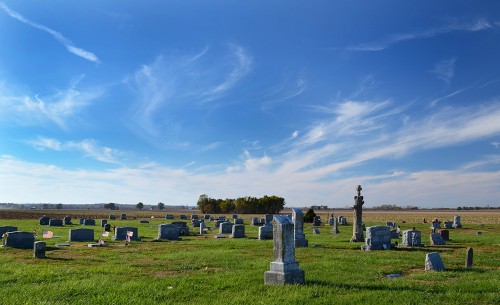 On the way to catch her plane in St. Louis, Curator Jessica and I took a side trip over to Kaskaskia Island. About two-thirds of the way to what was left of the town, we spotted a cemetery out in the middle of the farmlands. With a little searching, we found a road that took us to Kaskaskia Cemetery. (The name “Cemetery Lane” helped.) (Click on the photos to make them larger.)
On the way to catch her plane in St. Louis, Curator Jessica and I took a side trip over to Kaskaskia Island. About two-thirds of the way to what was left of the town, we spotted a cemetery out in the middle of the farmlands. With a little searching, we found a road that took us to Kaskaskia Cemetery. (The name “Cemetery Lane” helped.) (Click on the photos to make them larger.)
It was a cold, windy day that didn’t lend itself to wandering around much. When we got back to the car, I told Jessica that this was exactly what Gordon Parks was talking about in his poem In This Huge Silence, then I called the post up on my iPad. I like it well enough that it’s worth repeating.
In this huge silence
The prairie is still in me,
in my talk and manners.
I still sniff the air for rain or snow,
know the loneliness of night,
and distrust the wind
when things get too quiet.
Having been away so long
and changed my face so often,
I sometimes suspect that this place
no longer recognizes me—
despite these cowboy boots,
this western hat and
my father’s mustache that I wear.
To this place I must seem
like wood from a different forest,
and as secretive as black loam.
This earth breathes uneasily under my boots.
Their odor of city asphalt
doesn’t mix well with the clean smell
of wild alfalfa and purple lovegrass.
It puzzles me that I live so far away
from our old clapboard house
where, in oak tree shade,
I used to sit and dream
of what I wanted to become.
I always return here weary,
but to draw strength from
This huge silence that surrounds me,
knowing now that all I thought
was dead here is still alive,
that there is warmth here—
even when the wind blows hard and cold.
“I lift my eyes up to the hills”
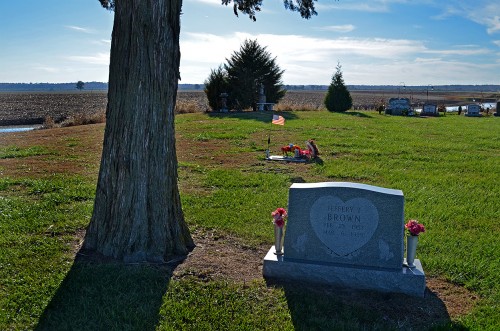 Shortly after we got back on the road, I noticed the normally effervescent Jessica was unusually quiet and she had a strange, distant look on her face. A few weeks later, I sent her an email asking if she remembered that moment and would be willing share what was going through her mind.
Shortly after we got back on the road, I noticed the normally effervescent Jessica was unusually quiet and she had a strange, distant look on her face. A few weeks later, I sent her an email asking if she remembered that moment and would be willing share what was going through her mind.
Here is her response: I don’t mind sharing what I felt that day, and still feel now, although it’s difficult for me to analyze why I reacted so strongly…
Perhaps it was the perfect storm of circumstances; I wonder if I had been there alone if I would have reacted the same way. I apologize in advance that this may be disjointed and difficult to follow, but so is the inside of my head, sometimes.
I think the word that first came to my mind when walking through the cemetery was desolate, but I didn’t mean it in terms of death, at least not human death. I remember feeling that the world was very much alive there, almost relentlessly so, with the wind constantly tugging at my sleeves. I think the desolation I felt was more from the loneliness of the spot.
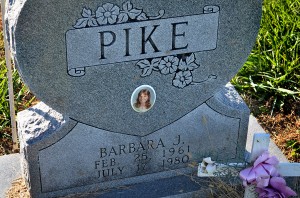 Here was this wind-whipped cemetery in the middle of harvested fields on a gravel road with no houses in sight. I remember being amazed at how recent some of the graves were, and I wryly wondered if there was anyone left in Kaskaskia to bury or to mourn.
Here was this wind-whipped cemetery in the middle of harvested fields on a gravel road with no houses in sight. I remember being amazed at how recent some of the graves were, and I wryly wondered if there was anyone left in Kaskaskia to bury or to mourn.
Impermanence and mortality are not usually things that bother me, but I felt the weight of those very strongly in that place. I also felt exposed, obviously emotionally, but physically, too. That landscape was so featureless (I know not literally, there was a river channel and a few trees) that I felt as if there was no shelter from it. It was like it forced itself upon me, demanding and unrelenting.
This is why the opening lines of Psalm 121 have always spoken to me: “I lift my eyes up to the hills – where does my help come from?” Hills and mountains are comforting to me in their strength and solidity; flat just seems barren. So, wandering around in this place made me feel like it was the cemetery at the end of the earth. That photograph is beautiful, by the way. When I see it, that loneliness comes back.
Now to Gordon Parks’ poetry. I think that poem was the perfect example of words capturing emotions that, at the time, I really couldn’t define. I think I was under control until I read the line about Parks having been away so long and changed his face so often that his home no longer recognizes him.
A fortress penetrated
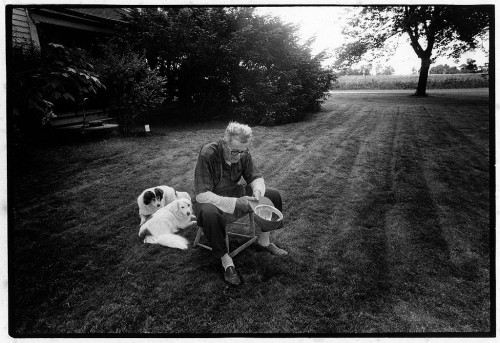 I wanted to pry into her subconscious because I recognized what she had experienced was the same overwhelming feeling I shared with you two years ago after shooting a farm auction. I’m pretty good at walling myself off from my subjects, but sometimes the fortress gets penetrated.
I wanted to pry into her subconscious because I recognized what she had experienced was the same overwhelming feeling I shared with you two years ago after shooting a farm auction. I’m pretty good at walling myself off from my subjects, but sometimes the fortress gets penetrated.
We’re back to normal
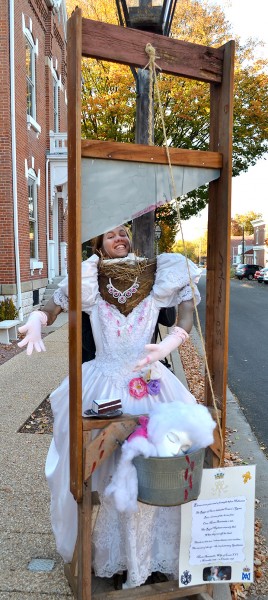 Her funk didn’t last too long. By the time we got to St. Genvieve, she was her normal perky self. She might have momentarily lost her composure on Kaskaskia Island, but, fortunately, she didn’t lose her head in St. Gen.
Her funk didn’t last too long. By the time we got to St. Genvieve, she was her normal perky self. She might have momentarily lost her composure on Kaskaskia Island, but, fortunately, she didn’t lose her head in St. Gen.
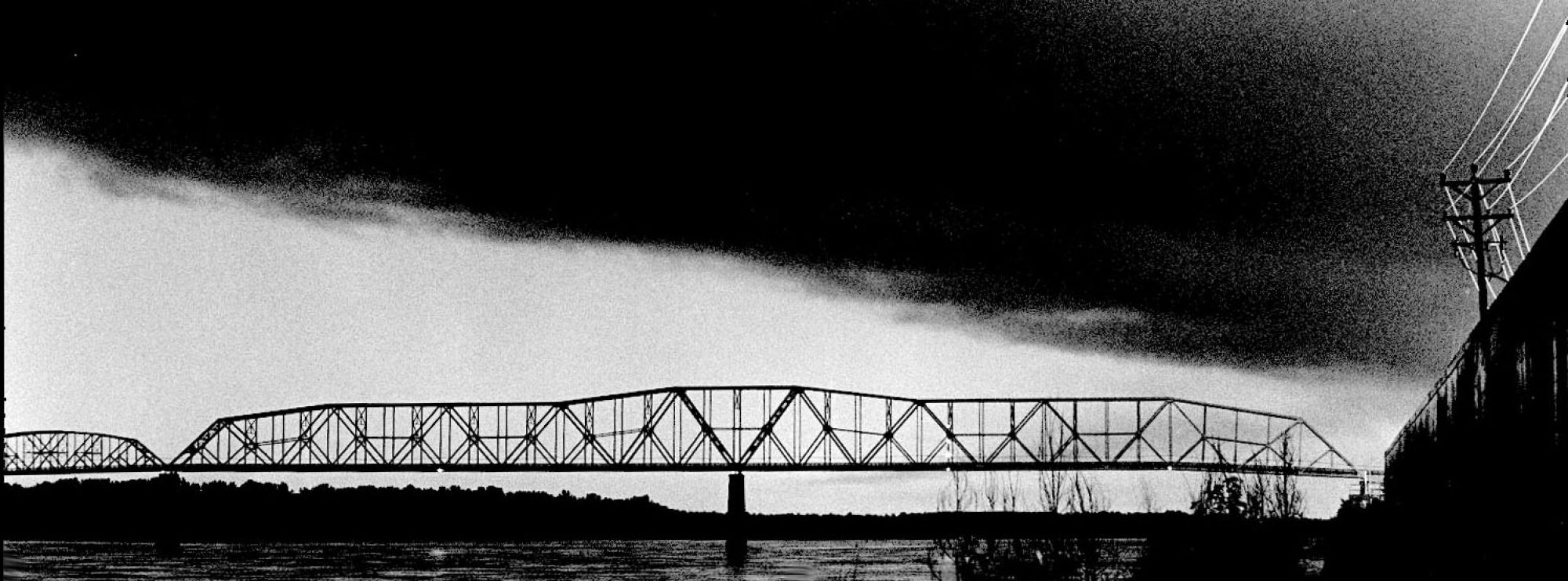
Ken, Your photo of the farmer after the auction is Pulitzer stuff! This photo really tells a poignant story : the old man who is at the end of his life as a farmer sitting alone with faithful companions on his carefully mown yard. The lines of cut grass lead our eye to another “alone”, a tree. The shrubs have grown to their mature size, an indication that they had been there a very long time! The photo truly captures what it feels like to auction off one’s life. Thanks for sharing your great photos!
Marcia Bonwell
I am always dismayed when I hear the first sentence of Psalm 121 spoken or used without the reply that was intended, when written, to accompany it.
I will lift up mine eyes unto the hills, from whence cometh my help? My help cometh from the Lord, which made Heaven and Earth.
Psalm 121 was intended as a blessing given to someone embarking on a journey (or our journey through life). People would look anxiously at the wooded hills (which implied hidden dangers). It indicates God will protect them on their journey and declares that God is not confined to a place or a time, that every step is guarded night and day; God watches over their every movement.
This becomes even more meaningful in Jessica’s context whether she recognized it or not.
Don’t worry, Keith, my Lutheran upbringing hasn’t completely deserted me. I’ve always loved the Psalms, and 121 is a particular favorite. I didn’t include Verse 2 because I figured most of Ken’s readers would already know it.
Jessica, my wife is particularly fond of that same passage; it was inside the chapel at Silver Dollar City. She was raised in Springfield, Mo and felt that the beautiful hills of the Ozarks brought her a silent peace. When she went through Adult Confirmation, she chose Psalm 121 v1 as her confirmation verse, but I insisted that she add verse 2 to complete the expression.
Ken,
LOVED THE POEM!!! THANKS FOR SHARING IT WITH US. Kaskaskia Island was mostly under water in the flood of ’93 and the river kept changing the boundaries with its silt deposits making it very difficult for title companies to decide whether or not it was on the Illinois side or Missouri. While working as a loan officer at Mercantile Bank in Cape, we had a customer who owned property there and I had never come across this (problem) with any of the many title searches that I had dealt with in almost 40 years as a banker.
Just found it very interesting how natural disasters can make so many changes to our topography; ie: floods and earthquakes such as the New Madrid Earthquake that caused the Mighty Mississippi to flow backwards and form lakes that were never there before. People either lose property or gain more from such happenings.
However, I let my mind wander too much. What I really wanted to say was, next time you’re back in that area, go onto the island and explore where houses, barns, churches etc. used to be or maybe survived the Flood of ’93.
I’ll never forget standing on the cliffs between McBride & Perryville looking out over the flooded Mississippi whereas it looked more like the ocean than a river because all one could see was water from the cliffs of Missouri to the banks of Illinois. Really eerie feeling!
ONE MORE THING. I, too, love the picture of the old man and his dogs and Marcia is right- IT IS A PULITZER PICTURE!
When you were wandering around the cemetery on the Island you had the “gift” of gazing upon my family and friends. The very people that farmed the fields that you were surrounded by. These folks are at “home” in the place they love best. There still are people from and “of” Kaskaskia! Our Church, the Church of the Immaculate Conception is maintained, with hard work from a few, along with our cemetery. While the wind was cold on that winter, imagine a very hot summer day and the cool breeze that is most always blowing there. Think of Carl Sandberg’s “bury this Illinois farmer with respect”, his hands are still shucking Illinois corn. Read that, then think of where you have been!